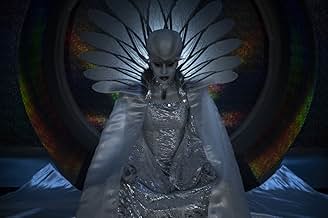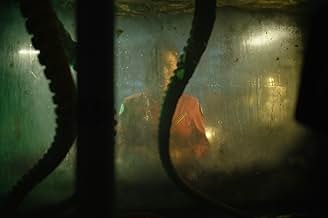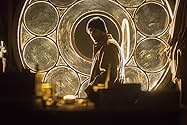Una versione aggiornata della serie antologica classica con vari racconti di fantascienza, mistero e horror.Una versione aggiornata della serie antologica classica con vari racconti di fantascienza, mistero e horror.Una versione aggiornata della serie antologica classica con vari racconti di fantascienza, mistero e horror.
- Candidato a 1 Primetime Emmy
- 5 vittorie e 13 candidature totali
Sfoglia gli episodi
Recensioni in evidenza
The original Twilight Zone series was full of social commentary and messages that challenged society. With episodes touching on topics like racism, religion, censorship, greed, and corporatism, the show was far from a simple science fiction series. One might suggest the Twilight Zone started Hollywood's tradition of engaging in social and political issues.
So why did this concept work so well in the 1960s while receiving so much backlash today? The answer is simple: politics is more polarizing than it has been in recent history.
Rod Serling, the writer of the original series, set out to challenge viewers by creating content that neither the tv executives nor the regulators felt would make for a positive outcome, but they were wrong. It was a big success.
However, when revisiting old episodes, it's clear that Serling's radical approach to writing was still tame enough to appeal to most average American viewers of that era. Today, writing about social topics that make people uncomfortable while avoiding ideological backlash seems nearly impossible to do.
1964's episode "I Am the Night - Color Me Black" told the story of a town eager to hang an innocent black man after he was wrongfully convicted of killing a racist white man in self-defense. 2019's episode "Replay" tells the story of a woman using a rewind button on a camcorder to protect her son from a racist police trooper. Just read the other reviews and see how today's polarized viewer responds to the latter.
To be fair, many of the ideas conveyed by Serling's original Twilight Zone were deliberately written to not appeal to either side politically. The same probably cannot be said about this current reboot. It would be interesting to see if Serling could take on this challenge today.
Maybe the solution to this problem is to no longer use social commentary in writing. Or maybe the writers could make more obvious right leaning episodes to even things out. One thing is for certain, as long as entertainment seeks to talk about the things that make us uncomfortable, you'll manage to alienate a lot of viewers... here.... in The Twilight Zone.
So why did this concept work so well in the 1960s while receiving so much backlash today? The answer is simple: politics is more polarizing than it has been in recent history.
Rod Serling, the writer of the original series, set out to challenge viewers by creating content that neither the tv executives nor the regulators felt would make for a positive outcome, but they were wrong. It was a big success.
However, when revisiting old episodes, it's clear that Serling's radical approach to writing was still tame enough to appeal to most average American viewers of that era. Today, writing about social topics that make people uncomfortable while avoiding ideological backlash seems nearly impossible to do.
1964's episode "I Am the Night - Color Me Black" told the story of a town eager to hang an innocent black man after he was wrongfully convicted of killing a racist white man in self-defense. 2019's episode "Replay" tells the story of a woman using a rewind button on a camcorder to protect her son from a racist police trooper. Just read the other reviews and see how today's polarized viewer responds to the latter.
To be fair, many of the ideas conveyed by Serling's original Twilight Zone were deliberately written to not appeal to either side politically. The same probably cannot be said about this current reboot. It would be interesting to see if Serling could take on this challenge today.
Maybe the solution to this problem is to no longer use social commentary in writing. Or maybe the writers could make more obvious right leaning episodes to even things out. One thing is for certain, as long as entertainment seeks to talk about the things that make us uncomfortable, you'll manage to alienate a lot of viewers... here.... in The Twilight Zone.
I think I'm being generous with a 6star rating.
The first episode is pretty painful to sit through. Should've been at least 15 minutes shorter, and was very predictable.
The second episode is a little bit better, but still kind of meh.
The best part about viewing this was it reminded me to watch the older episodes of Twilight Zone.
If you want to watch a great show that's kind of like T.Z, go check out Black Mirror.
The first episode is pretty painful to sit through. Should've been at least 15 minutes shorter, and was very predictable.
The second episode is a little bit better, but still kind of meh.
The best part about viewing this was it reminded me to watch the older episodes of Twilight Zone.
If you want to watch a great show that's kind of like T.Z, go check out Black Mirror.
The thing that sets the original The Twilight Zone apart is that each episode is expertly filmed, especially in its use of longer takes and slow moving panning shots, that cinematography helps to kick the tension into high gear, the new series doesn't do that and I can't figure out why? The cinematography in the first two episodes just did not draw me in, they explained too much right off the get go.
When you invoke the name of show that still maintains it's status as one of the most original things ever shown on the silver screen then you are already setting yourself up for failure.
The New show is a slow burn with each episode clocking in an hour AND YET they actually fail to get to the main point, properly introduced the characters, create atmosphere until the half way point.
If you still care about the episode by then, good for you...
The messages are relevant, "the comedian" which is the pilot deals with over sharing. How much of your life should be public. In a world ruled by social media this should be a universal story.... instead there is a complete disconnect between you and the protagonist because for all he shares you really know nothing about him as a viewer. You also get the sense that they want to distance themselves from black mirror so refuse to go the social media route which just seems like tying your hand behind your back.
The ideas here might be sound but the execution is terrible. Go watch black mirror.
On a personal note :- The Twilight Zone aired over 60 years ago in the late 50s... how does it have the better opening? They attempted to replicate it and it looks so bad, Even parodies attempt some originality! You're the twilight zone, how can you NOT attempt something original?!
The New show is a slow burn with each episode clocking in an hour AND YET they actually fail to get to the main point, properly introduced the characters, create atmosphere until the half way point.
If you still care about the episode by then, good for you...
The messages are relevant, "the comedian" which is the pilot deals with over sharing. How much of your life should be public. In a world ruled by social media this should be a universal story.... instead there is a complete disconnect between you and the protagonist because for all he shares you really know nothing about him as a viewer. You also get the sense that they want to distance themselves from black mirror so refuse to go the social media route which just seems like tying your hand behind your back.
The ideas here might be sound but the execution is terrible. Go watch black mirror.
On a personal note :- The Twilight Zone aired over 60 years ago in the late 50s... how does it have the better opening? They attempted to replicate it and it looks so bad, Even parodies attempt some originality! You're the twilight zone, how can you NOT attempt something original?!
I've just finished watching the first four episodes, and I went from excited anticipation, to disappointed, to fed up enough to bail on future episodes.
Each episode seems to be plot-focused on targeting one identifiable group as perpetual racists, and another group as perpetual victims.
The science fiction is a minor incidental to the series.
Rod is turning in his grave! Shame on this reboot!
Each episode seems to be plot-focused on targeting one identifiable group as perpetual racists, and another group as perpetual victims.
The science fiction is a minor incidental to the series.
Rod is turning in his grave! Shame on this reboot!
Lo sapevi?
- QuizAfter Ai confini della realtà (1959), Ai confini della realtà (1985) and The Twilight Zone (2002), this is the fourth "Twilight Zone" television series. There have also been two films in the franchise: Ai confini della realtà (1983) and Twilight Zone - Ai confini della realtà (1994).
- ConnessioniFeatured in Half in the Bag: Us and Paddleton (2019)
I più visti
Accedi per valutare e creare un elenco di titoli salvati per ottenere consigli personalizzati
- How many seasons does The Twilight Zone have?Powered by Alexa
Dettagli
Contribuisci a questa pagina
Suggerisci una modifica o aggiungi i contenuti mancanti

Divario superiore
What was the official certification given to The Twilight Zone (2019) in Japan?
Rispondi









































